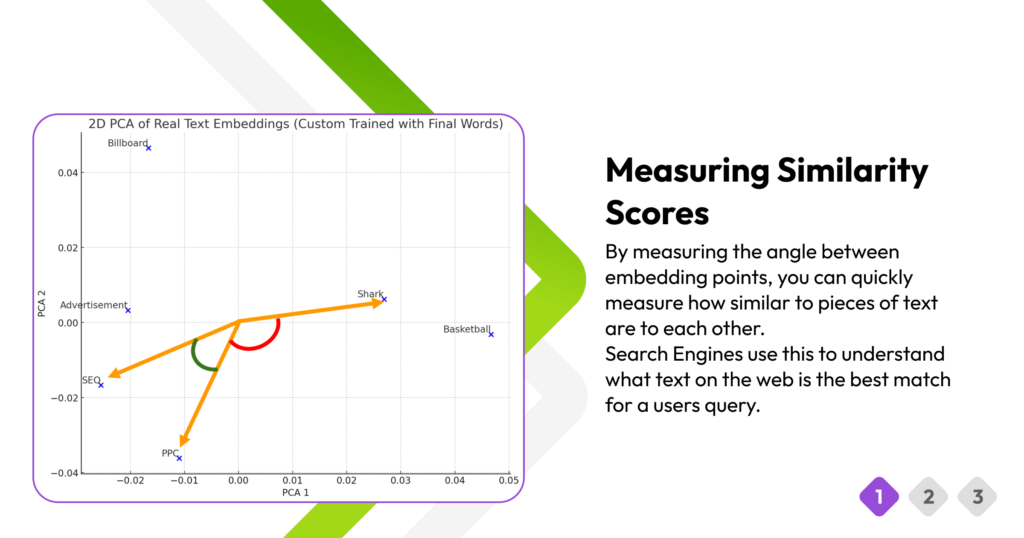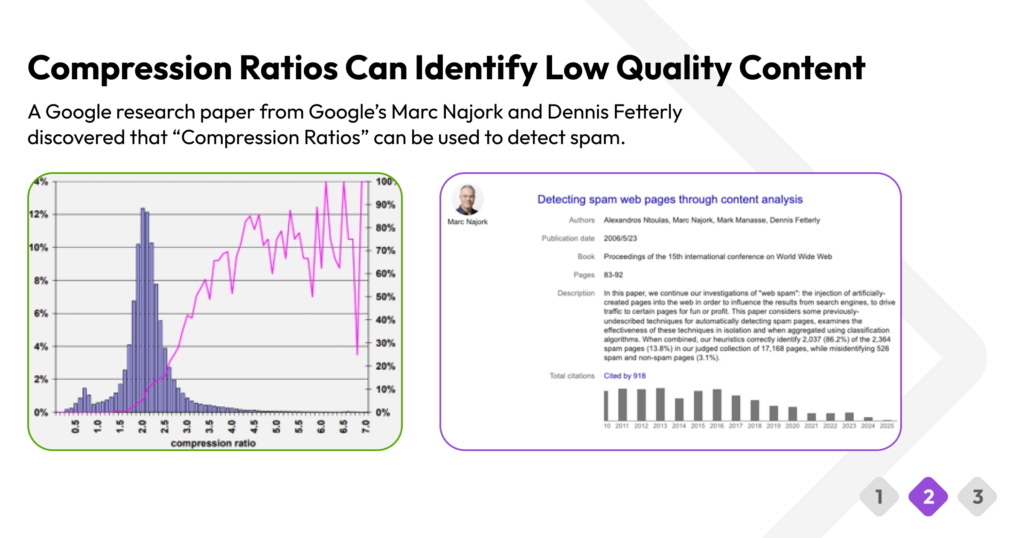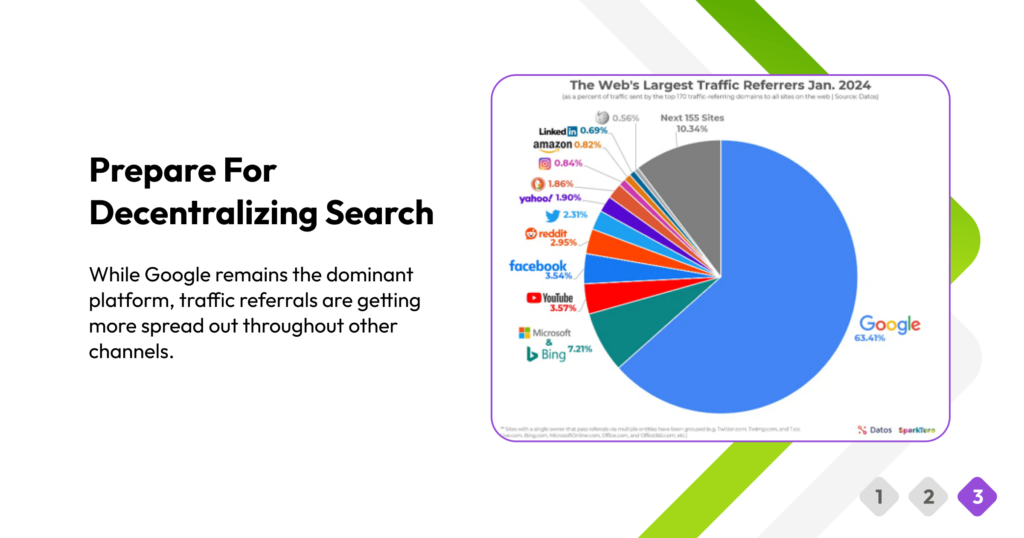
Did you know that over 3.1 billion visits were recorded on ChatGPT in September 2024 alone, surpassing Bing’s market share? AI-powered search engines are rapidly transforming the SEO landscape, challenging traditional ranking methods and redefining how brands gain visibility.
Google’s latest developments, including the widespread integration of Gemini AI and the evolution of ChatGPT’s deep research capabilities, are at the forefront of this shift. As AI-powered search engines grow in prominence, marketers and SEO professionals must adapt to new SEO ranking factors, content optimization strategies, and visibility opportunities.
In our recent webinar, industry experts Chris Long and Kalina MacKay explored the future of SEO in 2025 in an AI-driven world. Here’s a breakdown of the key insights shared during the session, including actionable AI SEO strategies to boost rankings and drive revenue.
Google’s AI Overviews & Ranking Fluctuations
Google continues to reshape search with AI-powered search engines, causing significant ranking fluctuations. While Google’s latest earnings report highlights revenue growth, Google AI Overviews are shifting search behaviors and challenging traditional SEO approaches. Understanding how AI search optimization interprets and prioritizes content is essential for success.
According to Chris Long, VP of Marketing at Go Fish Digital, “Google’s AI updates are making it clear that ranking strategies must evolve. AI-driven search is no longer a future concern—it’s happening now.”
ChatGPT’s Deep Research Feature
OpenAI’s ChatGPT recently launched a deep research function that lets users input criteria—such as budget and features—and receive in-depth reports after analyzing 50+ sources. This AI-driven capability has powerful applications for keyword research, automating content analysis, and competitive benchmarking.
With deep research, users can generate highly refined insights in minutes, transforming how SEO research and content strategy are approached.
As AI reshapes SEO, marketers need a new approach to content relevance, optimization, and user intent alignment.
Vector Embeddings & Cosine Similarity
Traditional keyword matching is becoming obsolete. Google now evaluates SEO content using vector embeddings and cosine similarity—a mathematical approach that measures how closely content aligns with a search query.
Actionable Tip: Leverage Google’s open-source BERT model or AI-powered SEO tools to assess cosine similarity and optimize content for AI-driven search.
“SEO professionals need to shift their focus to cosine similarity,” says Chris Long. “This will give you insights on how Google systems actually score content.”

Compression Ratios for Content Quality
Google’s algorithm may use compression ratios as a proxy for content quality. Highly compressible content often signals redundancy, fluff, or low-value material—elements that can negatively impact search rankings. When content is too repetitive or lacks substantive insights, it becomes easier to compress, which AI-driven search engines may interpret as a lack of originality or depth.

Actionable Tip:
Use Python scripts to analyze content compressibility and identify sections with excessive repetition or filler. Refining these areas can enhance readability, improve engagement, and strengthen SEO ranking factors by ensuring content delivers real value.
In today’s AI-driven search, quality over quantity is essential. If your content isn’t providing unique insights, AI will catch it—and so will Google’s algorithm. Prioritize concise, informative, and high-impact content to stay competitive.
Google is No Longer the Only Search Engine That Matters
According to Chris Long, “Search isn’t just about Google anymore. AI-driven platforms are becoming search engines in their own right.”
Users are increasingly searching on alternative platforms like LinkedIn, Reddit, Amazon, and Instagram. Meanwhile, AI-powered search engines like ChatGPT and Perplexity AI are gaining significant traction, surpassing Bing’s market share.

Optimizing for ChatGPT & AI Search
Brands must now optimize for ChatGPT search visibility by:
Tracking Your AI Search Visibility
Quick Tip: To verify whether your site is indexed by AI search engines, check your server logs for visits from crawlers like “GPTBot” (ChatGPT) and “PerplexityBot.”
Personalized Search & Specificity
AI-driven search trends favor content that aligns with user-specific needs. For example, REI ranks in both Google and ChatGPT for “best hiking boots for men with wide feet” due to its highly targeted content.
Using AI to Identify Content Gaps
If you’re not optimizing your content for AI search now, you’re already behind. Leverage tools like Google Autocomplete, ChatGPT, and keyword research platforms to discover AI-powered keyword research opportunities and create hyper-relevant content.
Structuring Content for AI & Google’s AI Overviews
To increase inclusion in Google AI Overviews, structure content using:
If you’re not optimizing your content for AI search now, you’re already behind.”
Quick Tip: Ensure content is optimized for both Google Search vs AI-driven search engines to maintain visibility.
Does Google Still Care About Links? Absolutely.
Despite ongoing claims that backlinks are becoming less important, recent studies continue to demonstrate strong correlations between effective backlink strategies and higher search rankings—particularly for competitive, high-impact SEO keywords. Backlinks remain a signal of credibility and authority to search engines. When reputable websites link to your content, it validates your content’s relevance and trustworthiness.
However, not all links are created equal. Quality matters far more than quantity. Links from spammy or low-authority domains can harm your rankings, while backlinks from well-established, industry-relevant sites strengthen your SEO position. Google’s algorithms are designed to assess these links in the context of user intent, topical relevance, and trust.
Actionable Tips:
Ultimately, backlinks are still a core part of Google’s ranking algorithm. While AI is enhancing how Google assesses content quality, backlinks remain one of the strongest indicators of authority in competitive searches. Investing in a thoughtful backlink strategy continues to be a crucial element of SEO success.
Effective Digital PR Strategies for SEO-Driven Link Building
Original research backed by survey data is highly valuable to journalists and bloggers looking for fresh insights. By publishing new statistics or industry trends, your content becomes a go-to source for citations and backlinks.
AI-powered tools can analyze search trends, keyword shifts, or user behavior patterns, offering unique, data-rich insights that others will reference. Proprietary research makes your content stand out, increasing the likelihood of backlinks from major publications.
Contests, challenges, and viral marketing campaigns can generate buzz and attract media attention. When done well, these campaigns lead to organic press coverage and inbound links from high-authority sites.
Position your brand as an industry thought leader by providing expert insights in guest articles, op-eds, and interviews. Journalists often seek expert commentary, and these opportunities lead to high-quality editorial backlinks from top-tier media.
Infographics, interactive tools, and evergreen guides tend to earn long-term backlinks as valuable reference materials. High-quality assets like these keep generating inbound links over time.
“Editorial backlinks still carry massive weight. The key is earning them through value-driven storytelling,” says Kalina Mackay.
Instead of chasing low-quality links, invest in content that naturally attracts authoritative sources. With Digital PR, strategic storytelling and data-driven insights remain the best way to secure backlinks that boost both SEO and brand credibility.
SEO Success Requires an Integrated Approach
Looking Ahead: Future-Proofing Your SEO for AI Search
Ready to refine your metrics strategy? Request a free 1-on-1 personalized audit to identify growth opportunities tailored to your business goals.
Whether it’s improving SEO, email performance, or paid ads, our team will provide actionable insights to help you achieve your growth objectives.
